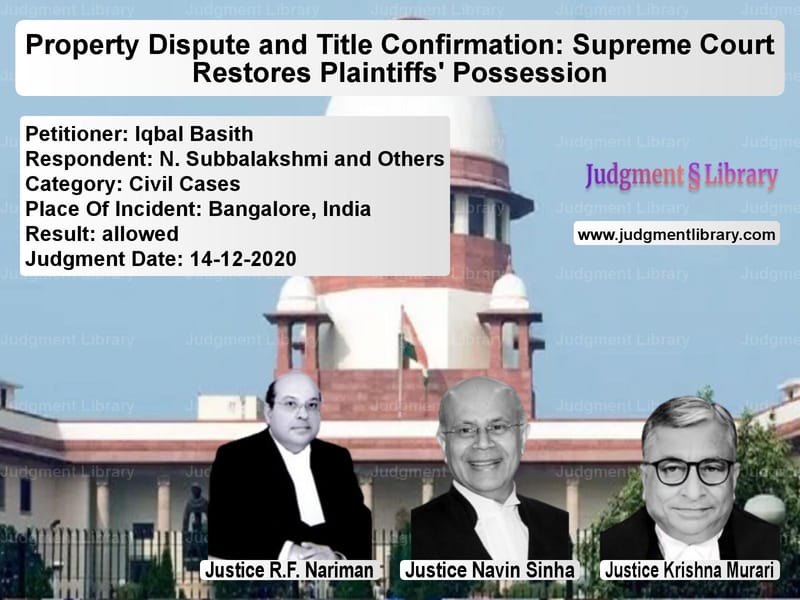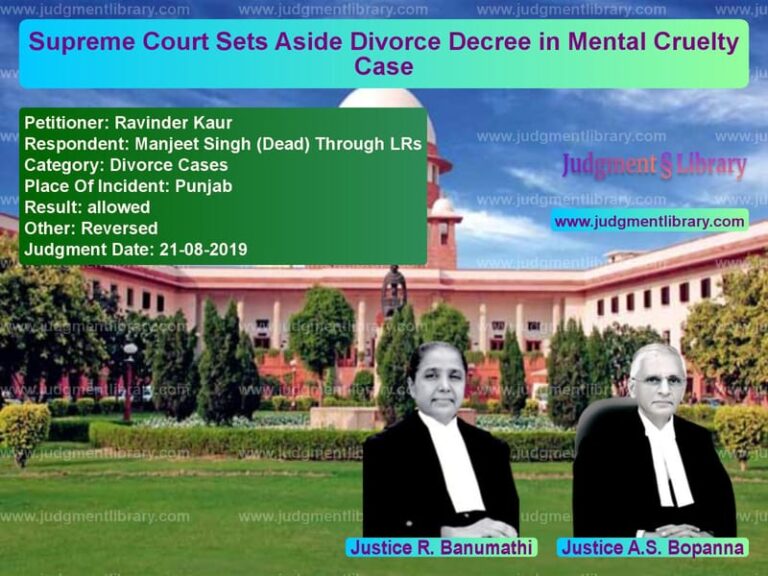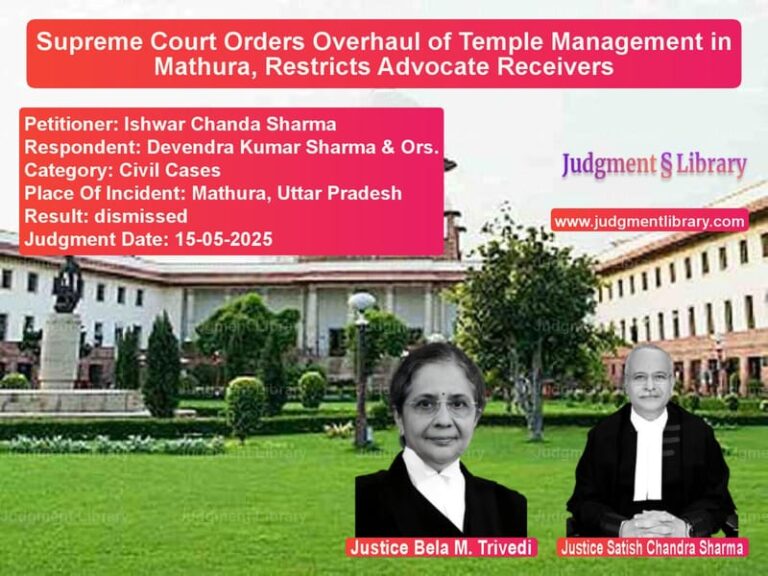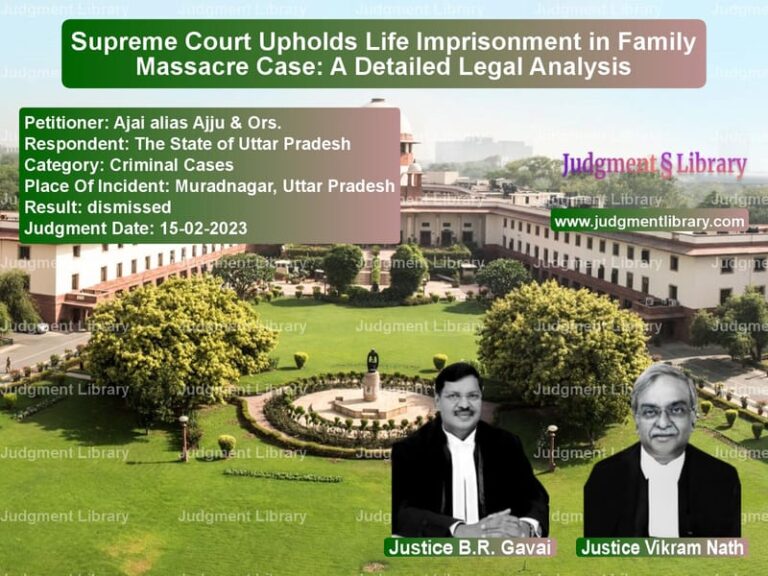Property Dispute and Title Confirmation: Supreme Court Restores Plaintiffs’ Possession
This case revolves around a dispute between Iqbal Basith and Others (the appellants) and N. Subbalakshmi and Others (the respondents) regarding the possession and ownership of a property located on J.C. Road, Bangalore. The case addresses the appellants’ right to seek a permanent injunction against the respondents for alleged encroachment on their property, with the primary issue being the rightful possession and title of the suit property. The appellants sought to prevent the respondents from interfering with their possession of the property that was purchased by the appellant’s mother in 1956.
Background of the Case
The appellant, Iqbal Basith, and his family had been in lawful possession of the property bearing No. 44/6 on J.C. Road, Bangalore, which measured 90 ft. x 110 ft. The property originally belonged to the Bangalore City Municipality and was sold to one O.A. Majid Khan in 1946. O.A. Majid Khan later sold the property to the appellant’s mother, Zahara Khatoon, through a registered sale deed in 1956. The appellants continued to possess and pay municipal taxes on the property, with entries in the property tax register showing their ownership.
The respondents, who owned property No. 42 at a distance of 103 feet from the suit property, attempted to encroach upon the appellants’ land by dumping construction materials and other materials. As a result, the appellants filed a suit in 1974 seeking a permanent injunction against the respondents to prevent the encroachment of their land.
However, the respondents, in their defense, claimed that they were the rightful owners of the suit property. They disputed the identity of the suit property and questioned the title of the appellants. The respondents also filed a counterclaim for possession of the property and sought dismissal of the appellant’s suit.
Petitioner’s Arguments
The appellants made the following arguments in their favor:
- Lawful Possession: The appellants argued that they had been in lawful possession of the property for several decades. They provided evidence of property tax receipts, municipal tax payments, and documents showing that the appellant’s mother, Zahara Khatoon, had purchased the property in 1956 through a registered sale deed.
- Title Deeds: The appellants produced copies of the sale deed executed by the Municipality in favor of O.A. Majid Khan and later sale deeds executed in favor of Zahara Khatoon. They emphasized that these documents were genuine and provided sufficient proof of their ownership.
- Disputing Respondent’s Claims: The appellants highlighted that the respondents did not have any title to the suit property, nor did they make any significant effort to prove their ownership. They further argued that the respondents’ attempt to encroach upon the land by dumping materials was illegal and needed to be restrained.
Respondent’s Arguments
The respondents countered the appellants’ claims with the following arguments:
- Identity of the Suit Property: The respondents contended that the appellants had failed to prove the identity of the suit property. They argued that the boundaries of the property had changed over time, and the appellants had not been able to provide conclusive evidence regarding the exact location and dimensions of the suit property.
- Title Issues: The respondents questioned the title of the appellants, claiming that the documents presented by the appellants, such as the sale deed from 1956, were either photocopies or not valid in the absence of original documents. They contended that the lack of original documents raised doubts about the appellants’ rightful ownership.
- Possession of Property No. 42: The respondents acknowledged that they owned property No. 42, which was located 103 feet away from the suit property. However, they emphasized that they had been in possession of the property for a considerable time and had made attempts to establish their claim over the property.
Supreme Court’s Analysis
The Supreme Court examined several key aspects of the case:
- Lawful Possession: The Court acknowledged the extensive evidence provided by the appellants, including the property tax records and municipal receipts, which confirmed their possession of the suit property. The Court found that the appellants had established lawful possession based on the documents submitted.
- Title Documents: The Court also considered the sale deeds executed by the Municipality in favor of O.A. Majid Khan and the subsequent sale deeds to Zahara Khatoon. Despite the respondents’ claim that the appellants had failed to produce original documents, the Court observed that the photocopies presented were valid as they were filed with the court and were not disputed by the respondents.
- Disputes Over the Identity of the Property: The Court noted that the appellants had sufficiently established the identity of the suit property, despite the respondents’ vague claims regarding the boundaries. The Court emphasized that the appellants had provided detailed documentation, including tax receipts and reports from the Pleader Commissioner, which confirmed their ownership of the suit property.
- Adverse Inference Against Non-Appearance: The Court observed that the original defendant (respondent) did not appear in person for deposition and cross-examination, and only a younger brother appeared with a power of attorney. The Court drew an adverse inference against the respondent for failing to present the original defendant for testimony, as per the principles laid down in Iswar Bhai C. Patel v. Harihar Behera.
Supreme Court’s Judgment
The Supreme Court allowed the appeal filed by the appellants and set aside the order of the High Court and Trial Court, which had dismissed the appellant’s suit. The Court ruled:
“The appellants have established lawful possession of the suit property through valid documentation, including sale deeds and property tax receipts. The respondents have failed to produce any concrete evidence regarding their claim to the suit property. The appellants are entitled to the relief of permanent injunction to prevent the respondents from encroaching on the land.”
The Court further directed:
“The appellants are entitled to continue their lawful possession of the suit property, and the respondents are hereby restrained from interfering with or encroaching upon the property. The appeal is allowed, and the Trial Court’s order is set aside.”
Conclusion
The Supreme Court’s decision reinforces the importance of clear and convincing evidence in property disputes, particularly when the ownership and possession of the property are in question. The judgment emphasizes that a party claiming ownership must produce concrete evidence, including original documents, to substantiate their claim. The ruling also illustrates the Court’s willingness to draw adverse inferences against parties who fail to appear for cross-examination, which can be crucial in establishing the credibility of a case.
Petitioner Name: Iqbal Basith.Respondent Name: N. Subbalakshmi and Others.Judgment By: Justice R.F. Nariman, Justice Navin Sinha, Justice Krishna Murari.Place Of Incident: Bangalore, India.Judgment Date: 14-12-2020.
Don’t miss out on the full details! Download the complete judgment in PDF format below and gain valuable insights instantly!
Download Judgment: Iqbal Basith vs N. Subbalakshmi and Supreme Court of India Judgment Dated 14-12-2020.pdf
Direct Downlaod Judgment: Direct downlaod this Judgment
See all petitions in Property Disputes
See all petitions in Damages and Compensation
See all petitions in Landlord-Tenant Disputes
See all petitions in Judgment by Rohinton Fali Nariman
See all petitions in Judgment by Navin Sinha
See all petitions in Judgment by Krishna Murari
See all petitions in allowed
See all petitions in supreme court of India judgments December 2020
See all petitions in 2020 judgments
See all posts in Civil Cases Category
See all allowed petitions in Civil Cases Category
See all Dismissed petitions in Civil Cases Category
See all partially allowed petitions in Civil Cases Category







